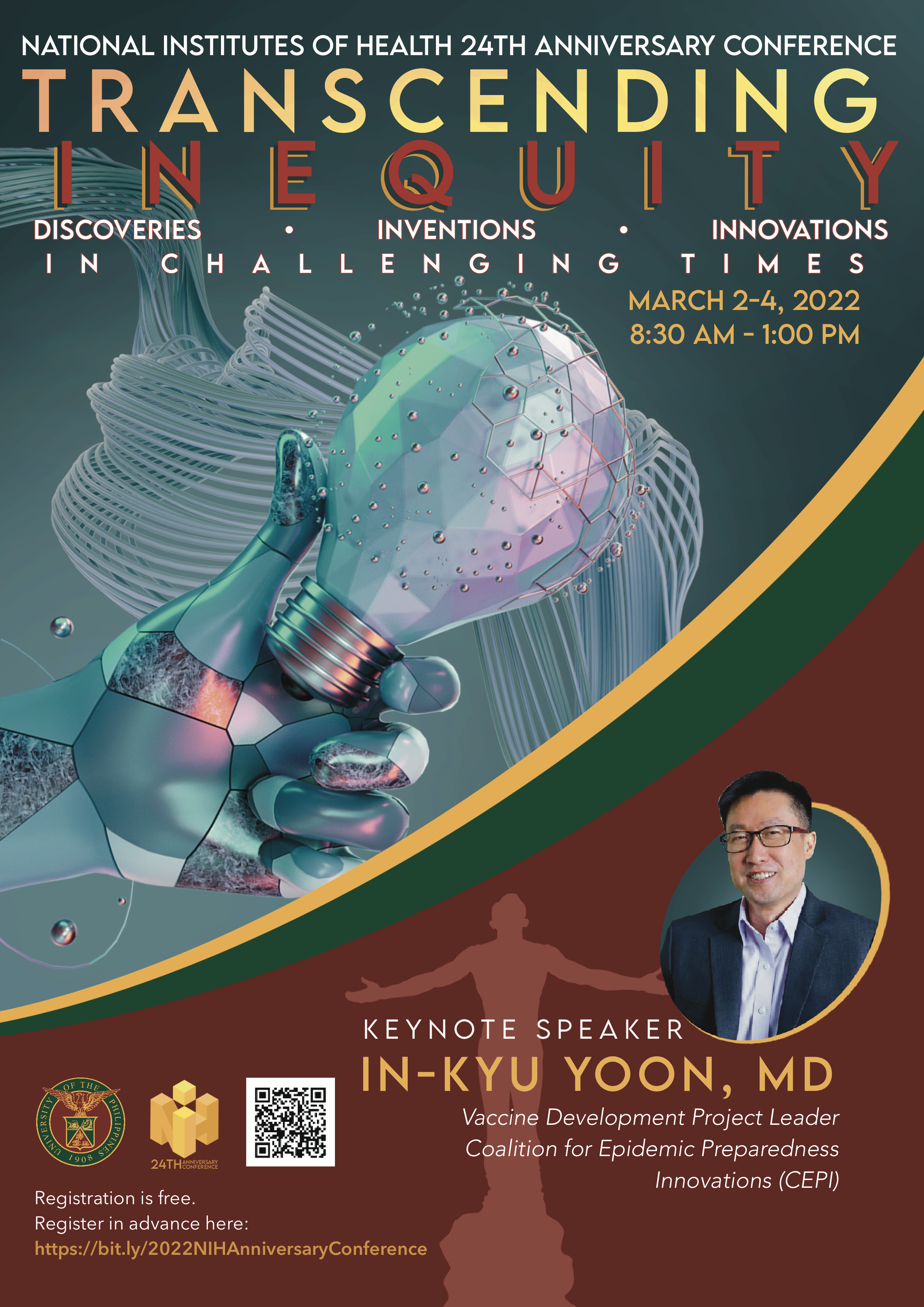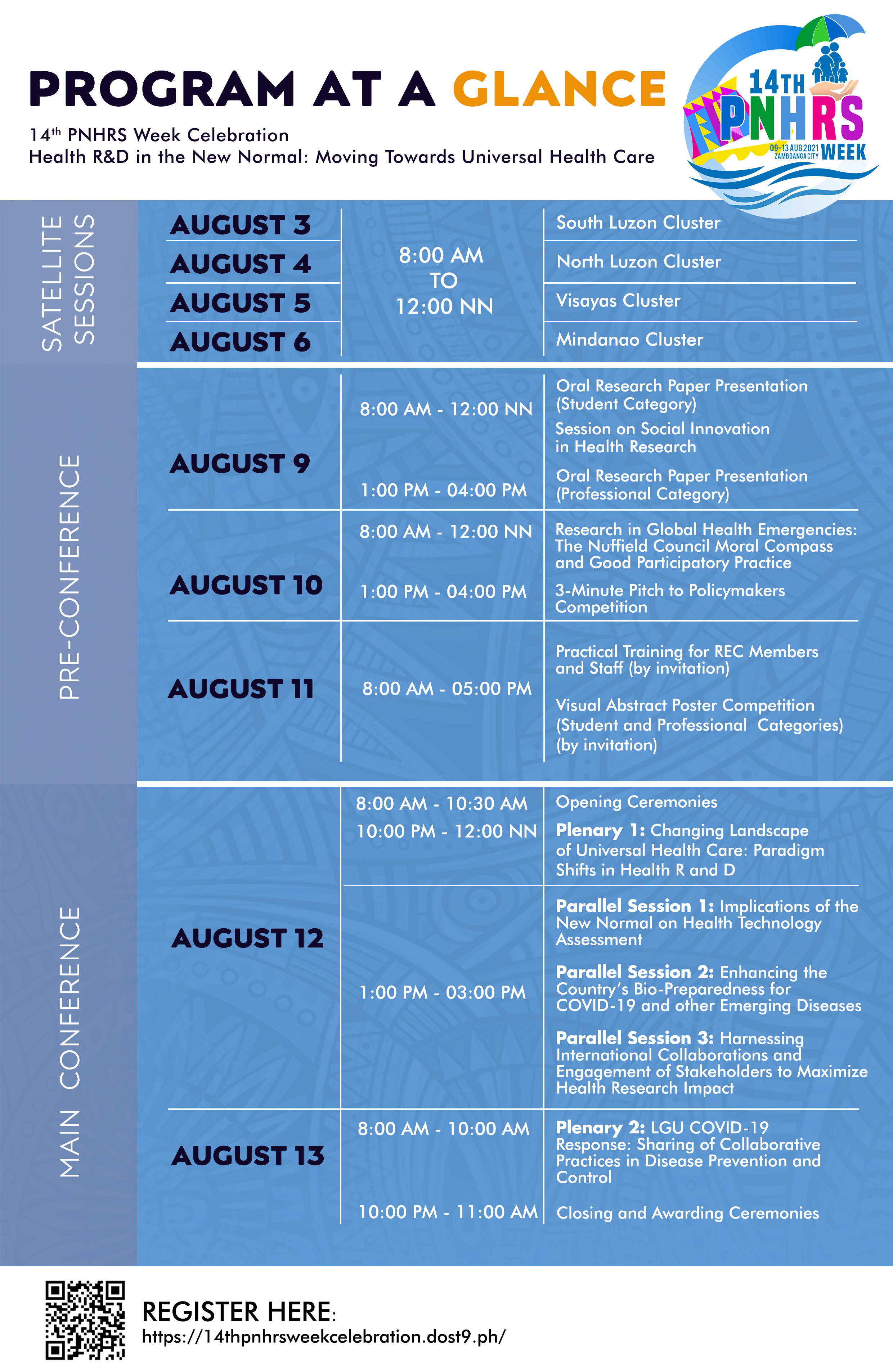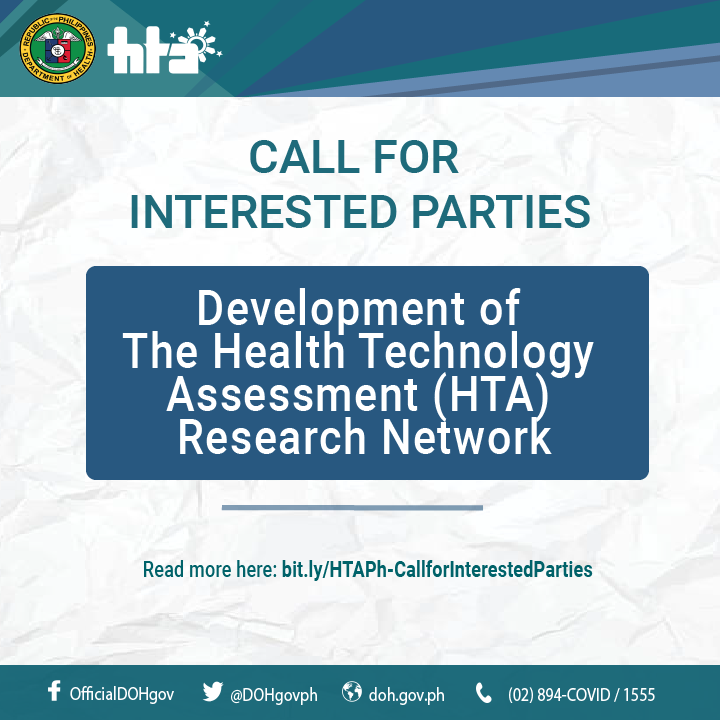- Christine Jane Gonzalez
- Latest News
- Hits: 1505
Webinar | Transcending Inequity: Discoveries, Inventions, and Innovations in Challenging Times
All are invited!
Register for FREE at bit.ly/2022NIHAnniversaryConference or use the QR code to register.



Virgin coconut oil supports faster recovery from signs and symptoms of COVID-19, based on a study funded by the Department of Science and Technology- Philippine Council for Health Research and Development (DOST-PCHRD).
The project entitled “The Beneficial Effects of Virgin Coconut Oil among Suspect and Probable Cases of COVID-19,” led by Dr. Imelda Angeles-Agdeppa of the DOST- Food and Nutrition Research Institute (DOST-FNRI), conducted a community trial in Sta. Rosa City that evaluated the effects of VCO as an adjunct supplement for COVID-19 by mixing VCO into the cooked meals of suspect and probable COVID-19 cases. In previous studies, VCO has been proven to contain compounds with anti-viral properties.
According to the National Institutes of Health, an adjunct supplement is a secondary treatment used to support or assist the primary treatment given to a patient.
The community trial was completed last October 2020 and showed that individuals who received the VCO added in their meals experienced faster recovery from the signs and symptoms of COVID-19. These results suggest that there is a high possibility to use VCO as an adjunct supplement for suspect and probable COVID-19 cases due to its anti-viral properties.
“These results are proof of our significant progress on the quest to look for accessible, safe, and effective interventions that support COVID-19 recovery. Through these efforts, the DOST-PCHRD hopes to lessen the health burdens of COVID-19 among Filipinos,” said DOST-PCHRD Executive Director Jaime Montoya.
While interim results provide favorable evidence, researchers emphasize that additional confirmatory studies should be done to determine the effectiveness of VCO as an adjunct supplement for COVID-19. Currently, the Valenzuela trials are still ongoing with 17 graduated participants and 12 ongoing participants. The project team is also coordinating with Muntinlupa City as an additional study site that will include participants with mild to moderate symptoms of COVID-19 which were not covered in the first two study sites.

Pursuant to the Universal Health Care (UHC) Act, all health technologies that the government will implement and cover shall undergo health technology assessment (HTA). This aims to ensure the rational utilization of various health technologies that will be funded by the government.
In this regard, a collaborative approach in HTA through the commissioning of independent academic teams and creation of a research network with the Department of Science and Technology (DOST) will streamline the work on evidence reviews, and accelerate the delivery of much-needed advice by decision-makers and health policy makers. Per Administrative Order 2020-0041, an HTA research network shall be formed jointly by DOH and DOST to support the activities of HTAU. This network aims to implement a research agenda related to HTA by developing methods guides and conducting assessments. The creation and development of the HTA research network shall follow a mechanism agreed upon by DOH and DOST.
Moreover, as one of the implementing partners of the Philippine National Health Research System as stipulated in RA 10532, the Department of Health (DOH) together with the DOST – Philippine Council for Health Research and Development, Commission on Higher Education, and the UP Manila – National Institutes of Health, seek to improve the health status productivity and “the quality of life of Filipinos.”
This project is therefore being undertaken to develop the HTA Research Network that will facilitate the conduct of assessments and development of HTA methods guides specific to selected health technologies.
For more information please visit : bit.ly/HTAPh-
------------------------------
Requirements:
Download Research capsule(Capsule Proposal) template
Interested parties may send their
requirements to This email address is being protected from spambots. You need JavaScript enabled to view it. on or before July 23, 2021
The Department of Science and Technology (DOST) and the Department of Health (DOH) will support a research which will look into the possibility of mixing and matching different COVID-19 vaccine brands and platforms through a study involving 3,000 Filipino participants starting June 2021.
“Ideally, an individual should complete two doses of vaccine using the same vaccine product. However, we cannot ignore the existing shortage in the global vaccine supply, which may interfere with the vaccine distribution and administration in the Philippines. It is urgently needed to ascertain the interchangeability of COVID-19 vaccines, as administering the second dose of vaccines with a two-dose regimen is vital in inducing the needed level of protection against the virus,” said DOST Secretary Fortunato de la Peña.
Aiming to determine the safety and analyze the immune response of individuals whose first dose is followed by a second dose of a different vaccine platform, the mixed-dose study will offer clinical data that will provide basis for the DOH in developing guidelines on the vaccination rollout, and on which vaccine regimen may be applied for an Emergency Use Authorization (EUA) during situations of limited vaccine supply.
Pending approval from the Food and Drug Administration (FDA) and health research ethics board, the study expects to enroll participants aged 18 years or older situated in eight priority areas for vaccine rollout following DOH allocation and the COVAX facility guidelines.
Secretary de la Peña further emphasized that the mixed-dose approach, if proven safe and effective, will help address possible shortage of vaccine products as interchangeable use of vaccine brands or platforms will offer flexibility in the vaccination rollout.
While there are similar studies being conducted in other countries, this study will specifically make use of vaccines being used in the country’s COVID-19 vaccination program and generate data from the Filipino people mixing COVID-19 vaccines after the first Sinovac vaccine dose which uses the inactivated virus platform. To be implemented by the Philippine Society for Allergy, Asthma and Immunology (PSAAI), with Dr. Michelle De Vera as the lead, the study will run for 18 months in conjunction with the vaccination rollout using the available vaccine supply in the Philippines.#